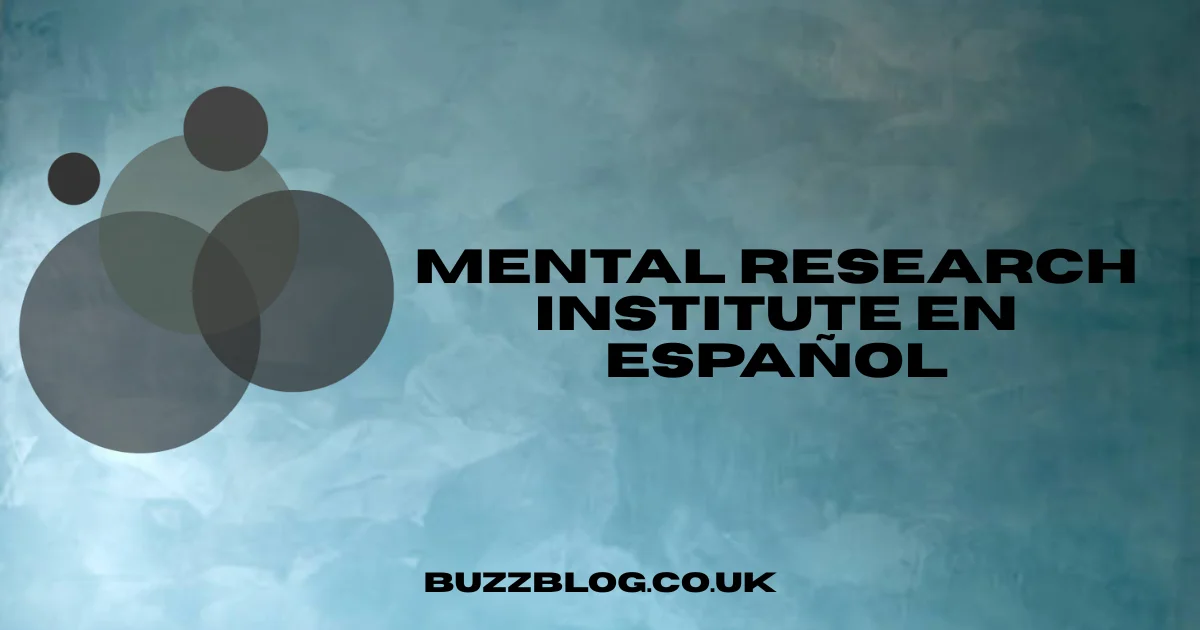Introduction
The mental research institute en español (MRI) in Palo Alto, California, is a world-renowned center for innovation in psychotherapy, especially in strategic and family therapy. With the increasing demand for culturally adapted education, the MRI has developed its Spanish-language program, known as Formación Estratégica en Terapia Familiar y Breve, to empower Spanish-speaking professionals around the world.
This program represents a bridge between the pioneering ideas born in Palo Alto and the diverse realities of therapists across Latin America and Spain.
The Legacy of the Mental Research Institute
Founded in 1959, the MRI became a revolutionary hub for understanding human behavior through systems thinking and communication theory. Led by influential figures like Gregory Bateson, Don D. Jackson, Paul Watzlawick, and John Weakland, MRI changed the course of psychotherapy forever.
Their research shifted the focus from the individual psyche to the patterns of interaction between people — a core concept in family therapy. This shift gave birth to Brief Therapy, an efficient and targeted model that aimed to solve problems rather than analyze them endlessly.
What is “Formación Estratégica en Terapia Familiar y Breve”?
The Strategic Training in Family and Brief Therapy (Formación Estratégica en Terapia Familiar y Breve) is a comprehensive program designed to help therapists, psychologists, counselors, and social workers master the principles of systemic and strategic intervention.
Its goal is simple yet profound: to teach professionals how to create meaningful change within families and individuals using focused, practical strategies — all taught in Spanish to ensure full understanding and cultural resonance.
MRI’s Influence in Family Therapy
MRI was among the first institutions to challenge traditional, long-term psychotherapy. Instead, it promoted brief, goal-oriented therapy that sought to interrupt problematic interaction patterns.
Imagine a family constantly caught in the same argument cycle. MRI-trained therapists focus on changing the sequence of communication, helping clients find solutions instead of dwelling on causes. This approach has influenced counseling centers, universities, and clinical practices worldwide.
Why the Spanish-Language Program Matters
Language shapes understanding — especially in therapy. The MRI’s decision to offer programs in Spanish acknowledges the growing community of Spanish-speaking therapists who seek access to the same high-quality training as their English-speaking peers.
This initiative makes advanced strategic therapy training accessible across Latin America, the U.S., and Spain, encouraging a richer exchange of cultural insights and clinical experiences.
Curriculum Overview of the Spanish Program
The program blends theory, practice, and supervision to build a strong foundation in systemic and strategic therapy. Key modules include:
- Introduction to Systems Thinking
- Communication Patterns in Families
- Brief Strategic Interventions
- Clinical Supervision and Case Studies
Participants engage in live supervision, role-playing, and online learning modules, ensuring both flexibility and hands-on experience.
Core Theoretical Foundations
The MRI approach rests on three main pillars:
- Systems Theory – Understanding human behavior as part of a larger network of relationships.
- Cybernetics – Observing how feedback loops maintain or disrupt family systems.
- Communication Theory – Focusing on how meaning is constructed through interaction.
Techniques in Brief Strategic Therapy
MRI’s methodology is famous for its creative interventions. Common techniques include:
- Reframing – Changing how a problem is perceived to shift behavior.
- Paradoxical Directives – Assigning the problem behavior deliberately to disrupt the pattern.
- Pattern Identification – Mapping recurring sequences of interaction that sustain the problem.
Each strategy is designed to break repetitive cycles and open new pathways for change.
Key Benefits of the Training
Graduates of the Spanish-language program gain:
- Mastery of brief and strategic methods
- Certification recognized internationally
- Enhanced cultural competence
- Access to MRI’s global professional network
This combination of theory and practice creates professionals who can make real, lasting changes in the lives of their clients.
The Trainers and Faculty
MRI’s faculty includes renowned experts in systemic and brief therapy. They bring decades of clinical experience, research knowledge, and cultural sensitivity. Many instructors are bilingual and have extensive experience working with Spanish-speaking clients, ensuring that the training remains relevant and inclusive.
Application and Admission Process
The program welcomes professionals in psychology, psychiatry, social work, and related fields. Applicants must provide:
- A professional background statement
- Academic transcripts
- Proof of language proficiency (Spanish)
Enrollment typically opens twice a year, and spots are limited due to the program’s intensive nature.
Career Outcomes After the Program
Graduates often pursue careers as:
- Family therapists and counselors
- Clinical supervisors and educators
- Consultants for community programs
- Private practitioners and organizational advisors
The MRI certification enhances credibility and opens doors to global opportunities in clinical and academic settings.
Testimonials and Success Stories
Past participants describe the experience as transformative. They highlight the clarity of methods, the depth of supervision, and the practical results achieved with clients. Many report that MRI’s training reshaped how they view family dynamics and empowered them to work more effectively within cultural contexts.
The Future of Strategic Therapy in the Spanish-Speaking World
As mental health awareness grows, so does the demand for culturally adapted therapeutic models. MRI’s Spanish-language training is helping to spread systemic and strategic thinking across Latin America, Europe, and beyond — fostering a new generation of therapists capable of addressing complex social and familial challenges.
Conclusion
The Mental Research Institute en Español stands as a beacon of innovation and inclusion in psychotherapy. Through its Formación Estratégica en Terapia Familiar y Breve, MRI ensures that the powerful legacy of Palo Alto’s systemic and strategic therapy continues to thrive — now accessible to the global Spanish-speaking community.

